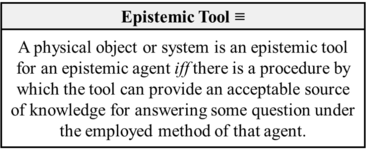Difference between revisions of "Modification:Sciento-2019-0016"
Paul Patton (talk | contribs) |
|||
| (2 intermediate revisions by 2 users not shown) | |||
| Line 9: | Line 9: | ||
|Authors List=Paul Patton, | |Authors List=Paul Patton, | ||
|Resource=Patton (2019) | |Resource=Patton (2019) | ||
| − | |Preamble=Tools and instruments, from a thermometer or a ruler to the Large Hadron Collider or the Hubble Space Telescope clearly play a central role in the process of scientific change. [[CiteRef::Patton (2019)]] However, the role of tools and instruments | + | |Preamble=Tools and instruments, from a thermometer or a ruler to the Large Hadron Collider or the Hubble Space Telescope clearly play a central role in the process of [[Scientific Change|scientific change]].[[CiteRef::Patton (2019)]] However, the role of tools and instruments in the process of scientific change is yet to be understood in scientonomy. Existing roles available within scientonomic theory do not seem appropriate. It does not seem plausible, for example, to treat tools and instruments as subjects of [[Authority Delegation|authority delegation]]. This is because the scientific data produced with epistemic tools is itself a kind of [[Theory|theory]], and therefore requires [[Mechanism of Theory Acceptance|assessment]] under the [[Method|employed method]] of the time. A tool or instrument is not capable of assessing its own data under the employed method, since that would require cognitive abilities, such as the ability to semantically understand propositions, which are still beyond the bounds of current artificial intelligence. Such an assessment requires an [[Epistemic Agent|epistemic agent]] intimately familiar with theories specifying the conditions under which the tool is a reliable source of knowledge.[[CiteRef::Patton (2019)]] Thus, a clear scientonomic notion of [[Epistemic Tool|epistemic tool]] is required. |
|Modification=Accept that the following symbol is to be used in scientonomic diagrams to depict epistemic tools: | |Modification=Accept that the following symbol is to be used in scientonomic diagrams to depict epistemic tools: | ||
Latest revision as of 17:28, 4 February 2020
Accept the definition of epistemic tool, stating that a physical object or system is an epistemic tool for an epistemic agent, when there is a procedure by which the tool can provide an acceptable source of knowledge for answering some question under the employed method of that agent.
The modification was suggested to Scientonomy community by Paul Patton on 26 December 2019.1 The modification is currently being evaluated; a verdict is pending.
Preamble
Tools and instruments, from a thermometer or a ruler to the Large Hadron Collider or the Hubble Space Telescope clearly play a central role in the process of scientific change.1 However, the role of tools and instruments in the process of scientific change is yet to be understood in scientonomy. Existing roles available within scientonomic theory do not seem appropriate. It does not seem plausible, for example, to treat tools and instruments as subjects of authority delegation. This is because the scientific data produced with epistemic tools is itself a kind of theory, and therefore requires assessment under the employed method of the time. A tool or instrument is not capable of assessing its own data under the employed method, since that would require cognitive abilities, such as the ability to semantically understand propositions, which are still beyond the bounds of current artificial intelligence. Such an assessment requires an epistemic agent intimately familiar with theories specifying the conditions under which the tool is a reliable source of knowledge.1 Thus, a clear scientonomic notion of epistemic tool is required.
Modification
Accept that the following symbol is to be used in scientonomic diagrams to depict epistemic tools:
Theories To Accept
- Epistemic Tool (Patton-2019): A physical object or system is an epistemic tool for an epistemic agent iff there is a procedure by which the tool can provide an acceptable source of knowledge for answering some question under the employed method of that agent.
Questions Answered
This modification attempts to answer the following question(s):
- Epistemic Tool: What is epistemic tool? How should it be defined?
Verdict
The modification is currently being evaluated; a verdict is pending.
Click on the Discussion tab for comments.
References
- a b c Patton, Paul. (2019) Epistemic Tools and Epistemic Agents in Scientonomy. Scientonomy 3, 63-89. Retrieved from https://scientojournal.com/index.php/scientonomy/article/view/33621.

